The most common moment of loneliness is when they are alone with their children, and the gender difference is particularly large in that women are 2.3 times more likely than men to feel lonely when they have "no opportunity to talk with adults.
- The following is content from the press release -
PIAZZA Corporation (CEO: Kohei Yano, hereafter "PIAZZA"), operator of the local community app "PIAZZA," conducted a "Questionnaire about raising children alone" survey of 998 male and female "PIAZZA" users (806 female, 172 male, 20 unanswered) who are raising children or have raised children. The survey was conducted among 998 male and female users of Piazza who are raising children or have raised children.
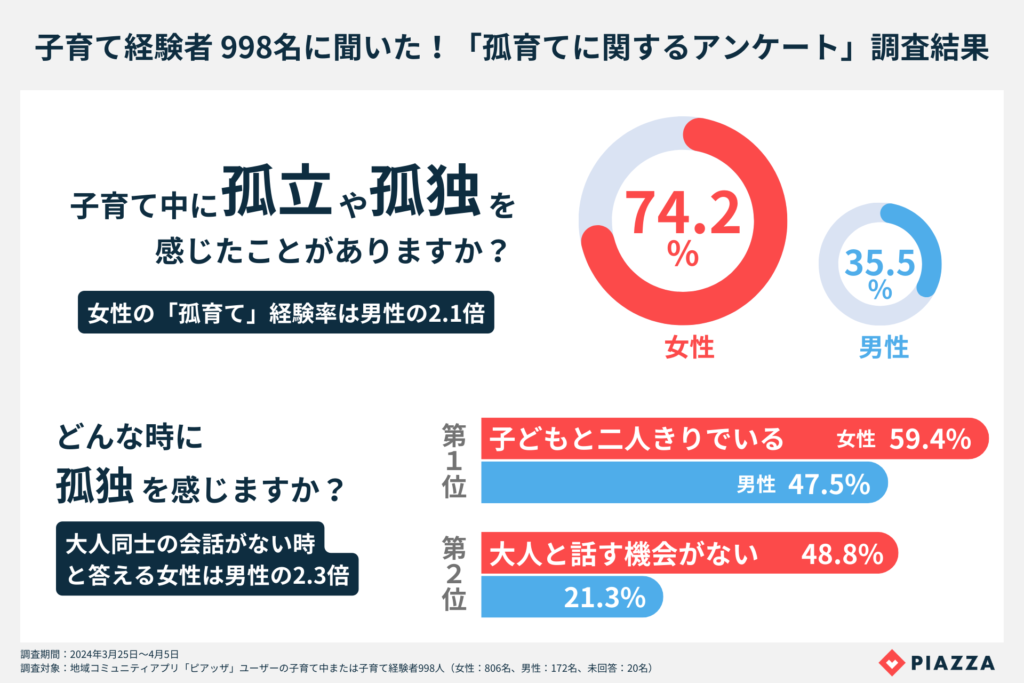
Key findings of the survey
- Percentage of experience raising an orphaned child: 74.2% of women have felt isolated or lonely while raising their children, 2.1 times more than men (35.5%). The most loneliness was felt when the first child was 0 years old (57.9%).
- Moments of lonelinessThe first ranking was the same for both men and women: when they are alone with their children. The second most common response for females was "I don't have a chance to talk to adults," which was 2.3 times more common than for males (females: 48.81 TP7T, males: 21.31 TP7T).
- Why I don't feel alone.The majority of both men and women, at more than 60%, answered that their "partner is cooperative". The proportion of women who "have a trusted parenting companion" is 6.1 times higher than that of men (38.51 TP7T for women and 6.31 TP7T for men).
- The one you want to rely on for childcare.Men most frequently chose "neighbors (40.7%)" as the person they would like to rely on outside of their family. More than half of the female respondents want to rely on "government services (52.1%)," but less than 20% of them are currently able to rely on them.
Survey Background
In December 2023, the government approved a cabinet decision to establish the "Anyone-Child Daycare System," which allows parents to use daycare facilities regardless of their work requirements, because "many families raising children are anxious and worried about "isolated child rearing. Approximately 150 municipalities will start the system on a trial basis during FY2024, with nationwide implementation planned for FY2026. This system is expected to alleviate the loneliness of the child-rearing generation, especially housewives (househusbands), while reducing the burden on childcare facilities and securing human resources for childcare workers have become issues.
In order to clarify the actual situation of loneliness and isolation of the child-rearing generation (solitary child-rearing), we conducted a survey on solitary child-rearing among users of the local community application "PIAZZA" who have experienced child-rearing. PIAZZA is working to create a town where people can support each other. We will continue to listen to the voices of local communities with the aim of realizing a community where everyone can live comfortably.
1 Source: Children and Families Agency, "Strategy for the Future of Children: Toward the Realization of Measures to Cope with Declining Birthrates of Different Dimensions," 2023.
Survey Results (Details)
1 Percentage of experience with orphaned children
1-1 Percentage of women who have felt isolated or lonely while raising children, 74.21 TP7T, 2.1 times higher than men (35.51 TP7T).
We asked 998 "Piazza" users who are raising children or have raised children if they have ever felt isolated or lonely while raising children. The results showed that 74.21 TP7T of women (total of 21.51 TP7T often and 52.71 TP7T sometimes) have felt lonely, 2.1 times more than men (5.21 TP7T often and 30.21 TP7T sometimes, total 35.51 TP7T sometimes) who have felt lonely. ), and were 2.1 times more likely to have felt lonely than men who had felt lonely before (5.2% often, 30.2% sometimes, 35.5% total).
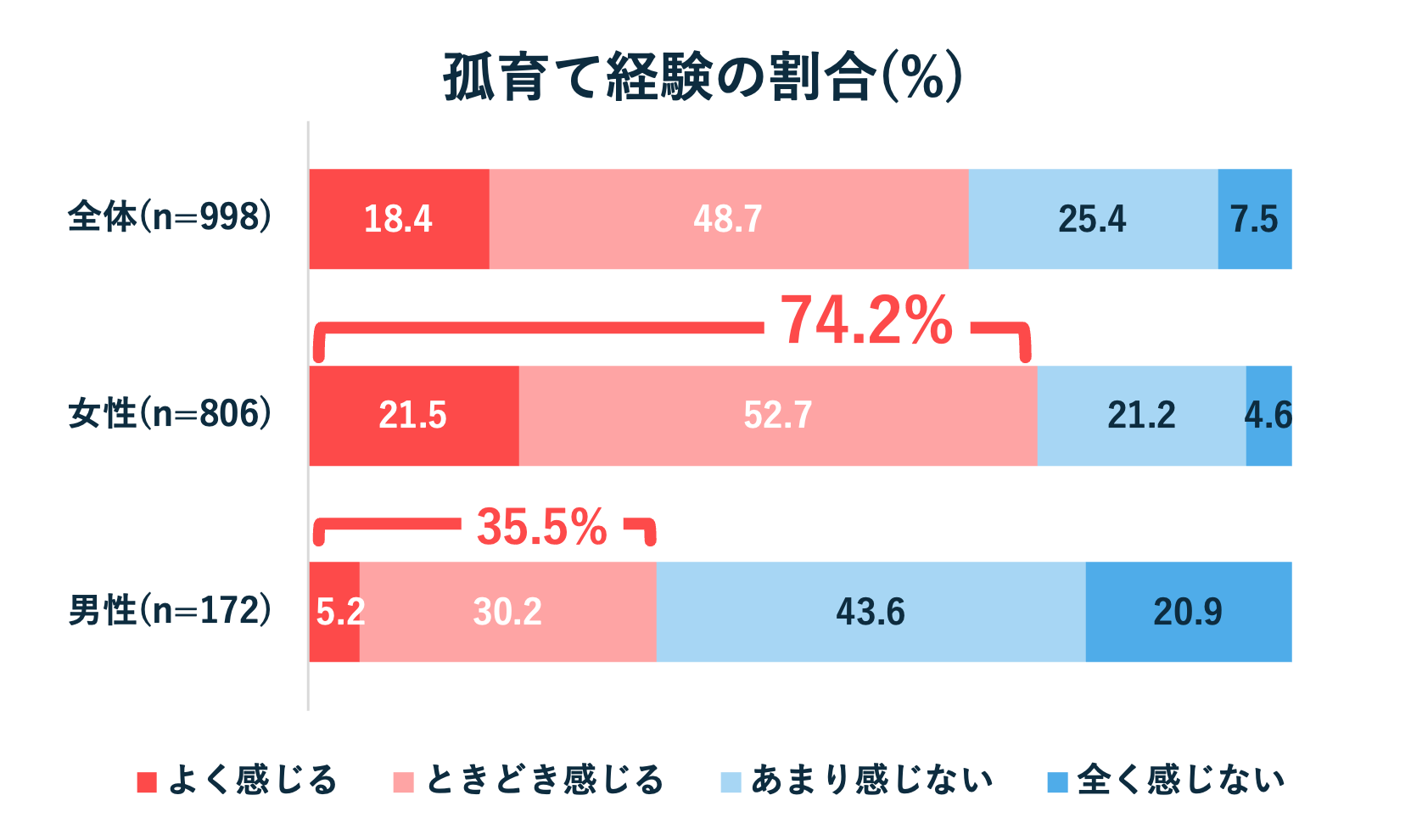
1-2 Full-time housewives (househusbands) are particularly likely to feel lonely (78.01 TP7T).
By occupation, full-time housewives (househusbands) were particularly likely to have felt lonely in child-rearing, with 78.0%, 10.85 pt higher than the overall average of 67.1% (total of 27.11 TP7T for feeling lonely often and 50.91 TP7T for feeling lonely sometimes). It can be said that those who have few connections or social contacts outside the home are more likely to feel lonely and isolated.

1-3 Age of children, the largest proportion of respondents felt lonely when their first child was 0 years old (57.91 TP7T).
Those who had ever felt lonely were asked how old their children were when they felt lonely. The highest rate of feeling lonely was from newborn to preschool age, especially when the first child was 0 years old, when 57.91 TP7T people felt lonely. As children get older, the chances of feeling lonely decrease, but regardless of the number of children, people tend to feel lonely when their children are 0 years old.
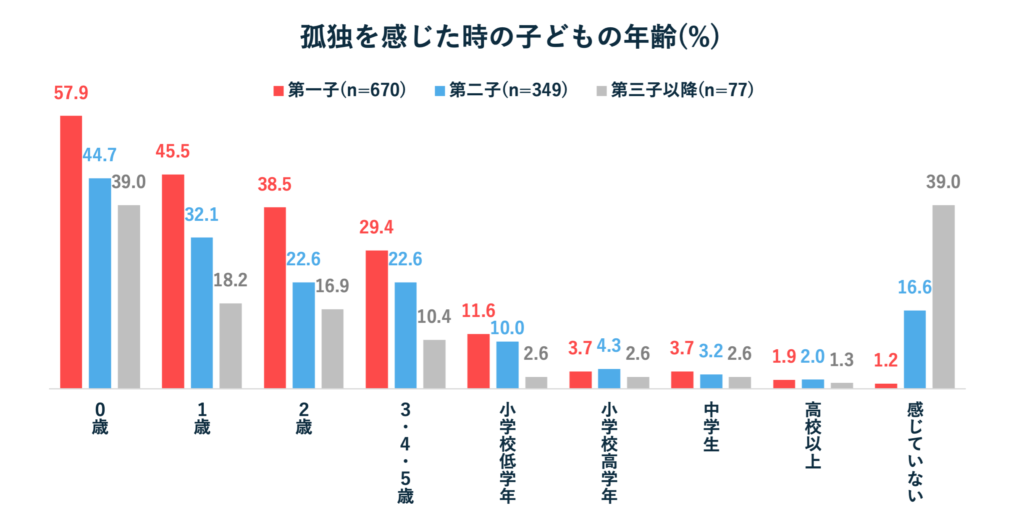
2 Moments of loneliness
2-1The most loneliness is felt by both men and women when they are "alone with children. The gender difference is particularly large for women, with "no opportunity to talk with adults" in second place (women: 48.81 TP7T, men: 21.31 TP7T), 2.3 times that of men (women: 48.81 TP7T, men: 21.31 TP7T).
When asked when they feel lonely, the most frequent response for both men and women was when they are alone with their children, with 59.41 TP7T for women and 47.51 TP7T for men. When we examined whether there was a difference in the moments when men and women felt lonely, we found that "not having a chance to talk with adults," which about half of the women reported feeling lonely, was 27.5 pt higher than that of men (21.31 TP7T) and 48.81 TP7T, a 2.3-fold difference in awareness.

2-2 Effective ways to cope with loneliness, women "go out" or "talk to someone who is raising children. Men "talk with your partner.
When asked about coping strategies that worked for them when they felt lonely, more than half of the women responded "going out (53.9%)" and "talking to someone who is raising children (50.5%). On the other hand, the most common response from men was "talking with my partner (47.5%)," indicating that there is a difference in communication partners between men and women.
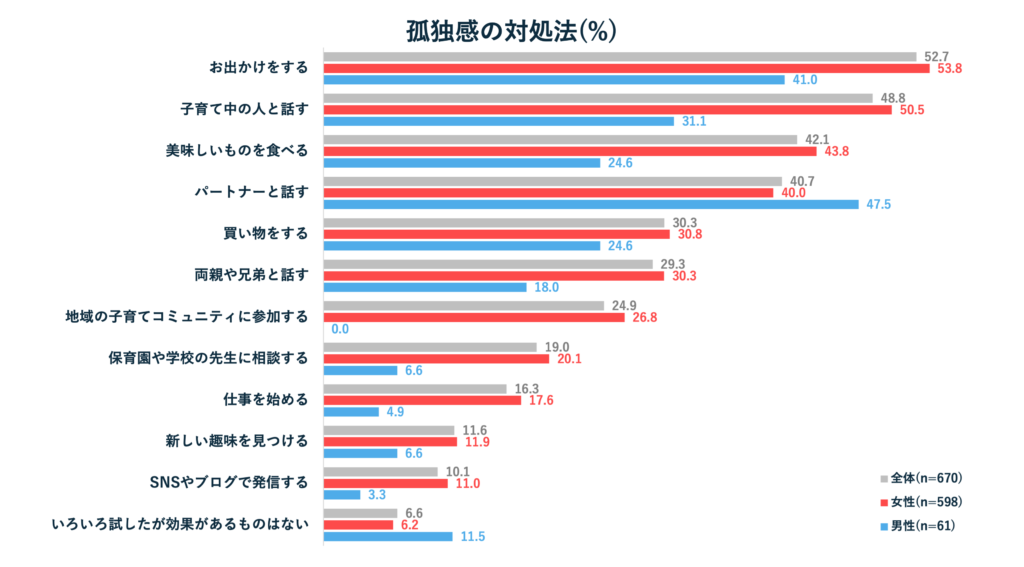
3 Reasons for not feeling lonely
3-1 Majority of both men and women (more than 60%) answered that their partners are cooperative. Women were 6.1 times more likely than men (6.3%) to have a parenting partner they can trust (38.5%).
When those who have never felt lonely while raising their children were asked why, more than 60% of both men and women answered that their partners were supportive (61.1% for women and 66.7% for men). This was followed by "parents (in-laws) and siblings are supportive (42.8%)" for women and "I have time for myself (33.3%)" for men. A particularly large difference in awareness between men and women was found in "having a trusted parenting companion," with 6.31 TP7T for men compared to 38.51 TP7T for women, 6.1 times higher than for men.
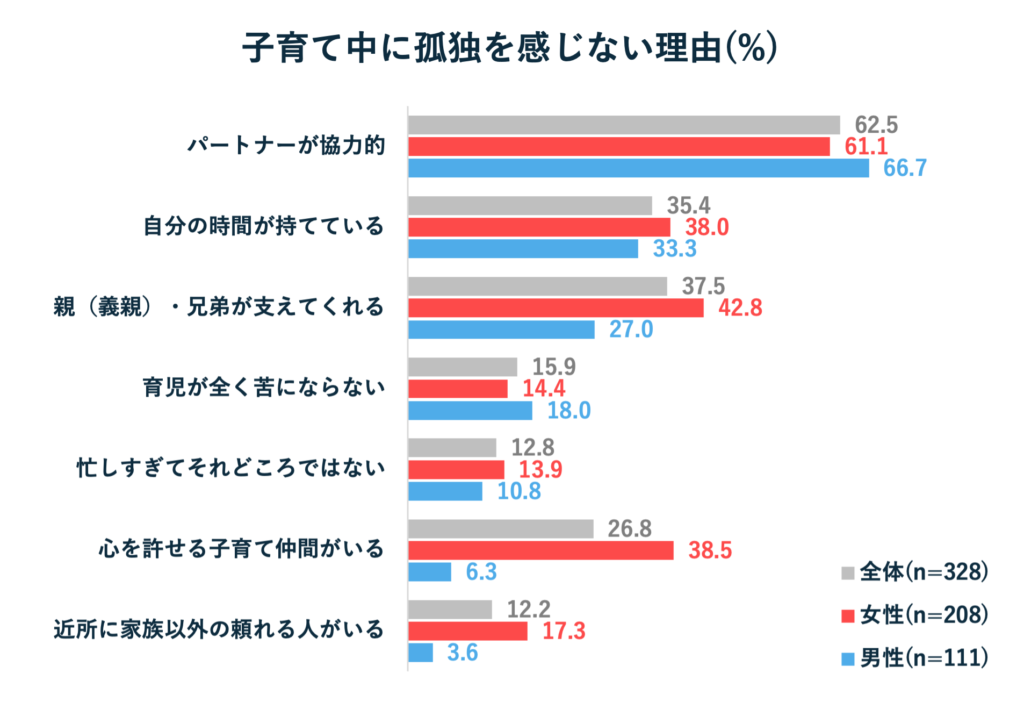
3-2 Advice for those who feel isolated and lonely in child rearing, "Don't keep to yourself, rely on people around you and community services."
We conducted an open-ended survey of those who had never felt lonely while raising their children, and asked them for their advice on how to avoid feeling lonely and isolated. Here are some of the "secrets to not feeling lonely" gathered from 175 respondents who had never experienced loneliness while raising their children.
4 A person to rely on for childcare
4-1 Family members that can be depended on for child-rearing, "partner" is No. 1 for both men and women, with about 80% (79.7%) of men.
Finally, we asked respondents about who they can rely on with regard to child-rearing. We found that "partner" was the most common family member that could be relied on for child-rearing, with women and men particularly high at 74.31 TP7T and 79.71 TP7T, respectively. While more than half of both men and women (55.21 TP7T for women and 51.21 TP7T for men) say they rely on their parents while raising their children, it was also revealed that one in ten respondents has no family members they can rely on.

4-2 Neighbors (40.7%) was the most frequent response for men, and "neighbors" (40.7%) was the most frequent response for women. The largest proportion of women chose "government services (52.1%)," but the difference between this and the proportion of respondents who "can currently rely on them" was the largest.
When asked who they could rely on for child-rearing other than family members, the most common answer was "teachers at day-care centers, kindergartens, and schools (45.61 TP7T)" for women (48.01 TP7T) and for men (36.31 TP7T). On the other hand, the most frequent answer for women (52.1%) was "government services (family support, etc.)," while the most frequent answer for men was "neighbors (40.7%). The results show the largest difference between the percentage of respondents who "currently rely on" these services and the percentage of those who "currently rely on" them, indicating that respondents want to rely on help in the community, such as government services and neighbors, but are not able to do so.
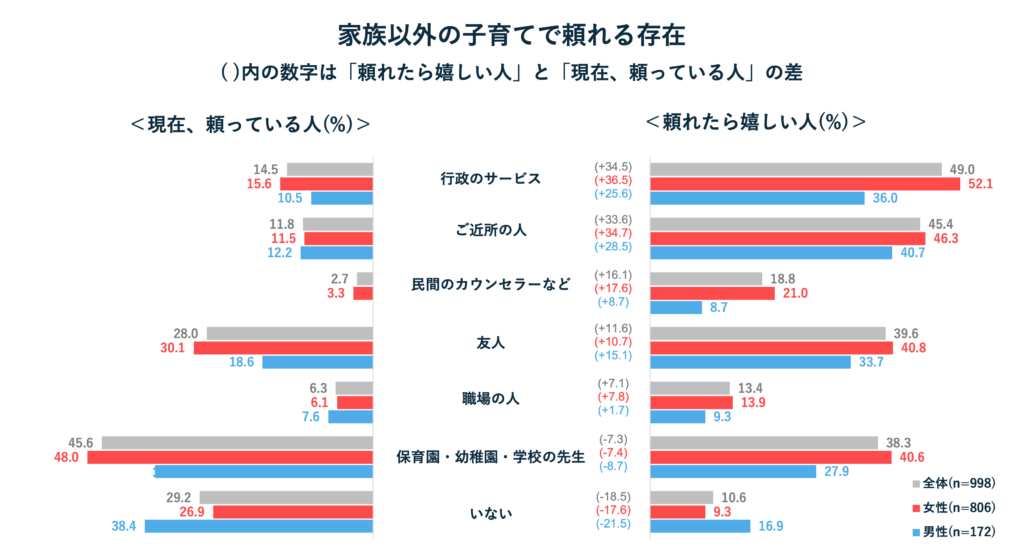
About Piazza, a local community application
Piazza" is a community-based social media platform that operates in more than 90 regions (areas), mainly in the urban areas of Tokyo, Kanagawa, Aichi, and Osaka, in cooperation with 70 local governments nationwide*. It has more than 150,000 users, and in Chuo-ku, Tokyo, approximately 40% of the child-rearing generation in their 30s and 40s use the service. The "Oshiete" function allows users to ask questions to people in town when they are in trouble, and the "Osho" function allows users to reuse unneeded items.
*As of April 2024
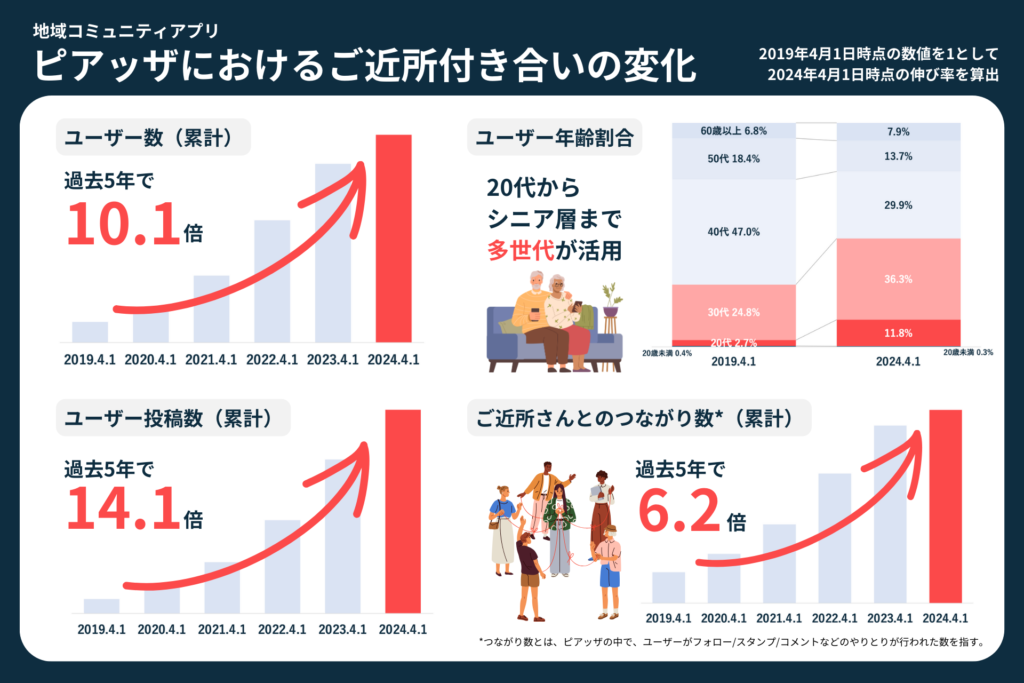
Survey on orphaned children
- Survey period: March 25-April 5, 2024
- Research entity: PIAZZA Corporation
- Survey method: Internet survey
- Survey target: Users of the local community app "Piazza" who are raising children or have raised children.
- Number of valid responses: 998 (women: 806, men: 172, non-response: 20)
- Respondent Attributes
o Gender: male: 17.21 TP7T / female: 80.81 TP7T / unanswered: 2.01 TP7T
▽Age: 20s: 4.61 TP7T / 30s: 48.81 TP7T / 40s: 34.91 TP7T / 50s: 9.41 TP7T / 60+: 2.31 TP7T
Occupation: Company employee: 48.91 TP7T / Company director: 1.31 TP7T / Part-time job: 13.91 TP7T / Public employee: 6.01 TP7T / Self-employed/ freelance: 6.21 TP7T / Housewife (husband): 21.81 TP7T / Unemployed: 1.81 TP7T
▽Current family members living together: spouse: 90.01 TP7T / children: 92.31 TP7T / parents: 4.61 TP7T / brothers, sisters: 0.91 TP7T / grandparents: 0.31 TP7T / none: 2.51 TP7T
o Place of residence: Hokkaido/Tohoku: 2.5% / Kanto: 68.51 TP7T / Tokai: 3.5% / Kinki: 24.21 TP7T / Unknown: 1.31 TP7T
*The composition ratio figures in this survey are rounded to the first decimal place, so the total may not always equal 100%.
About PIAZZA Corporation
With the mission of "creating a town where people can support each other," the company develops and operates the local community application "Piazza," plans and operates community facilities, connects local residents and people who work there, and engages in town development that combines real and digital technologies. The company is also involved in community building that combines the real and digital worlds. The company aims to solve the issues of local communities caused by global urbanization, the weakening of local communication, and the decline in local communities that serve as receptacles for such communication.
Company name: PIAZZA Corporation (https://www.about.piazza-life.com/)
Location: 5th Floor, Greenhill Building, 10-8, Nihonbashi Kayabacho 1-chome, Chuo-ku, Tokyo
Representative: Kohei Yano, Representative Director
Date of establishment: May 2015
Mission: To create a city where people support each other
Business activities: Planning and operation of digital community apps / area management / local marketing support / local business support




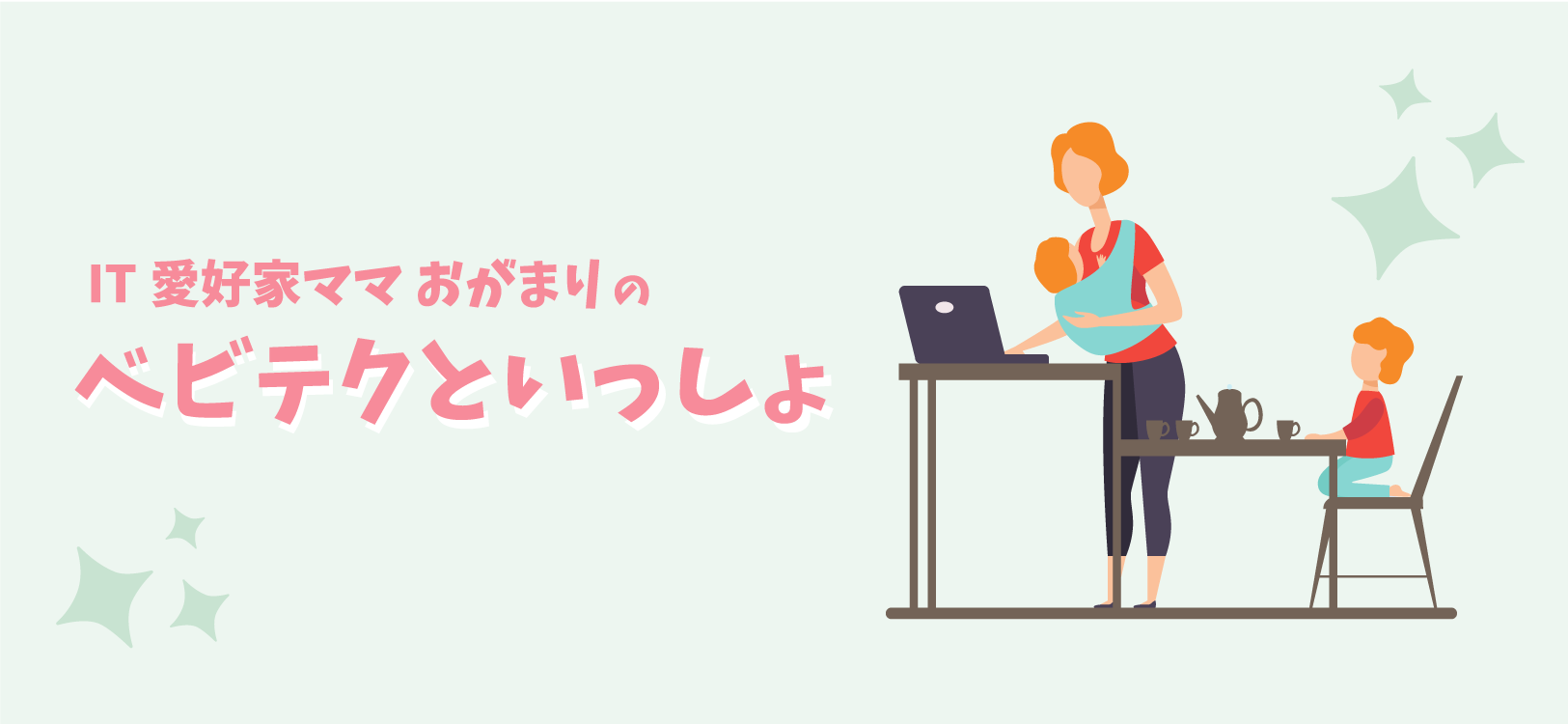






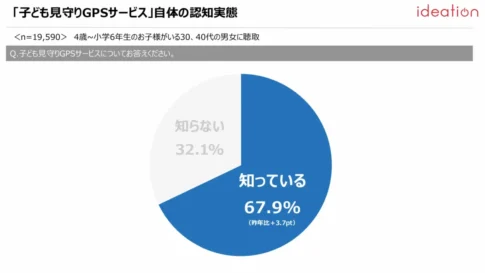


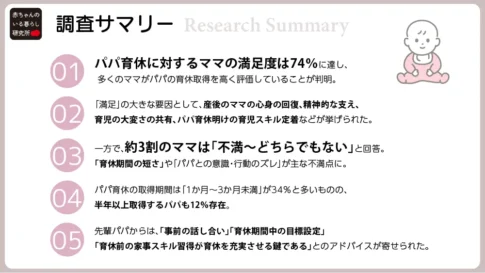
- I want people around me to cooperate with me instead of keeping it to myself. (40s female, Kanagawa)
- If you are in trouble, don't keep it to yourself, but rely on those around you! Just sharing your difficulties with someone else will lighten your heart. (Male, 30s, Tokyo)
- Don't hesitate to rely on your relatives and people around you! (Male over 60, Chiba, Japan)
- I went to a neighborhood event and found many children the same age as me. We exchanged contact information, and from there we attended more and more events and got to know each other, making many friends. (30s female, Kanagawa Prefecture)
- Let's create a place where we can consult with each other, just on social networking sites. (40s female, Tokyo)
- I think it would be good to have more people to consult with at parks and other places. (30s male, Kanagawa Prefecture)
- I still keep in touch with friends I met at the motherhood class during my pregnancy, and we have become friends with whom I can talk about anything. I think you can meet wonderful friends by going out and participating in social events as much as possible. (30s female, Osaka Prefecture)
- I feel more comfortable if I go to a children's center or ask for advice at my pediatrician's office. (30s female, Tokyo)
- Talk and chat with teachers and mothers at the Children's Support Center. (30s female, Tokyo, Japan)